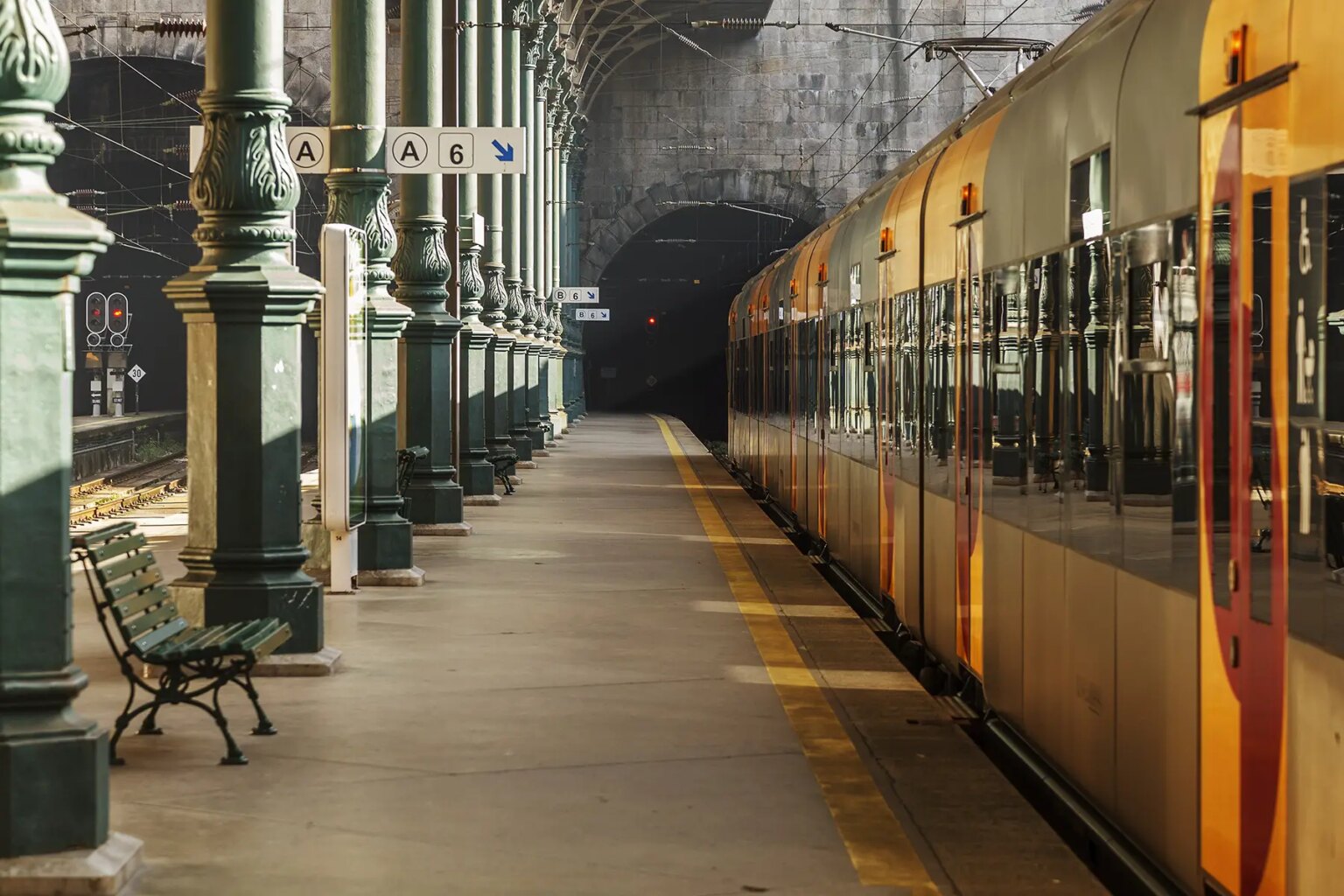You don’t need to drive a car in Portugal to get around and see all that the country has to offer. There is an efficient, user-friendly, and affordable public transportation system in Portugal that compares well with any other country in Europe. To help get you moving, we’ve put together a handy guide that covers the following topics:
- Public transportation in Portugal
- Trains in Portugal
- Buses in Portugal
- Taxis, ride-sharing, and other car services in Portugal
- Other methods of public transportation in Portugal
- Public transportation discounts and financial aid in Portugal
- How disability-accessible is public transportation in Portugal?
- How environmentally friendly is public transportation in Portugal?
- Public transportation safety tips in Portugal
- Making a public transportation complaint in Portugal
- Useful resources
Public transportation in Portugal
Despite its size, Portugal has a dense and accessible public transport network that spans the entire country, providing reliable connections to major cities and international destinations. Trains, trams, buses, taxis, and funiculars in the country are clean, efficient, and user-friendly. According to the International Union of Railways, over 86 million rail passengers in Portugal traveled 2.2 billion kilometers in 2020, with tram and bus passengers covering another eight billion kilometers. Public commuters in Lisbon spend an average of 45 minutes each day on public transit. One out of four transit users in Portugal has a daily commute of two hours or more.
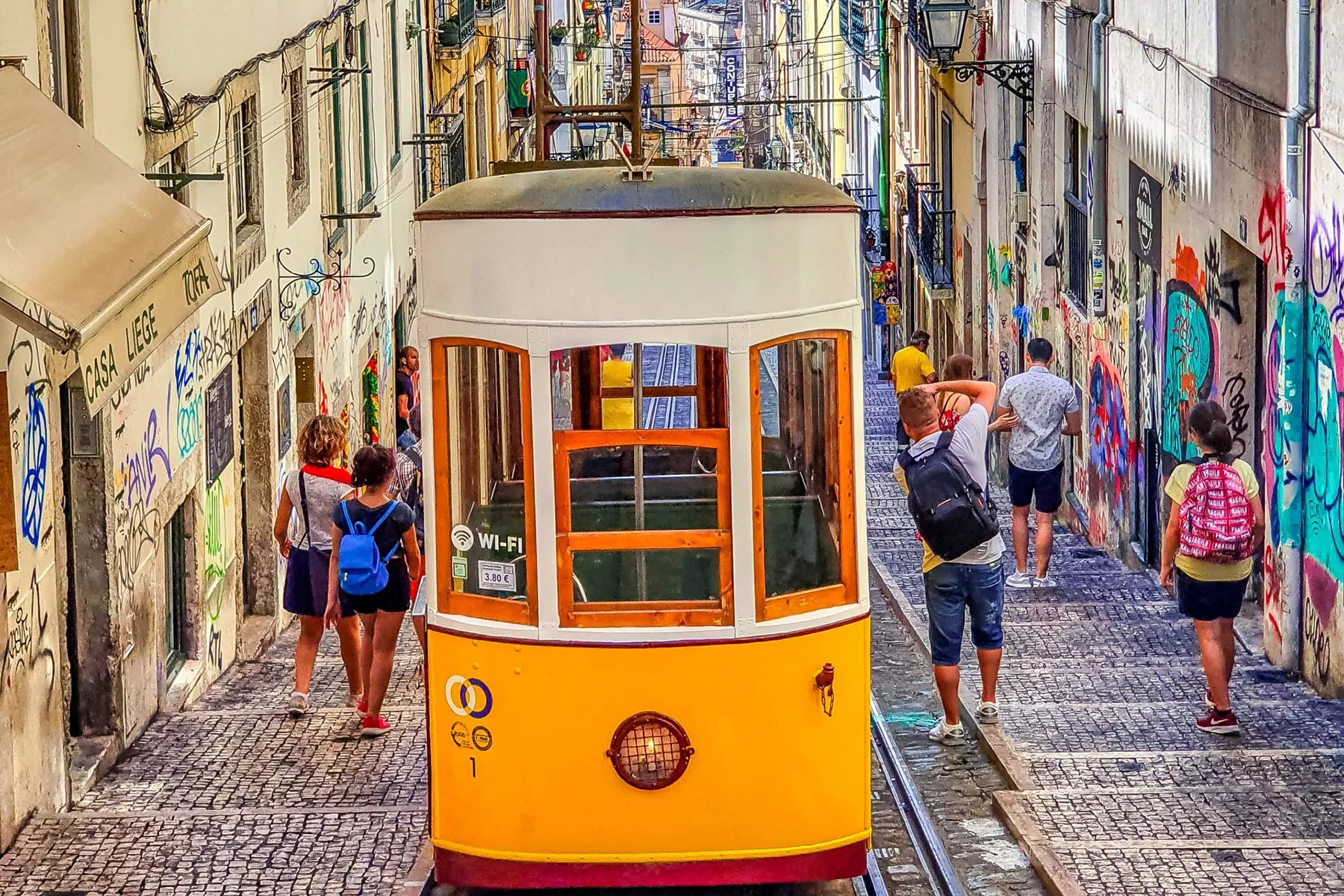
Most public transportation companies in Portugal have websites and mobile apps with up-to-date information on timetables, routes, and ticketing. Omio is a handy travel website that pools results from train, bus, and flight tickets in Portugal. While better prices can often be found directly on the providers’ websites, Omio is well-presented and helpful in comparing travel options.
Trains in Portugal
Portugal’s rail system is managed by the state-owned national train operator Comboios de Portugal (CP). CP oversees an extensive, scenic rail network that serves 145 million passengers each year. While train services extend to most of the country, the fastest and most frequent connections are between major cities such as Lisbon, Porto, Aveiro, Coimbra, Faro, and Lagos.
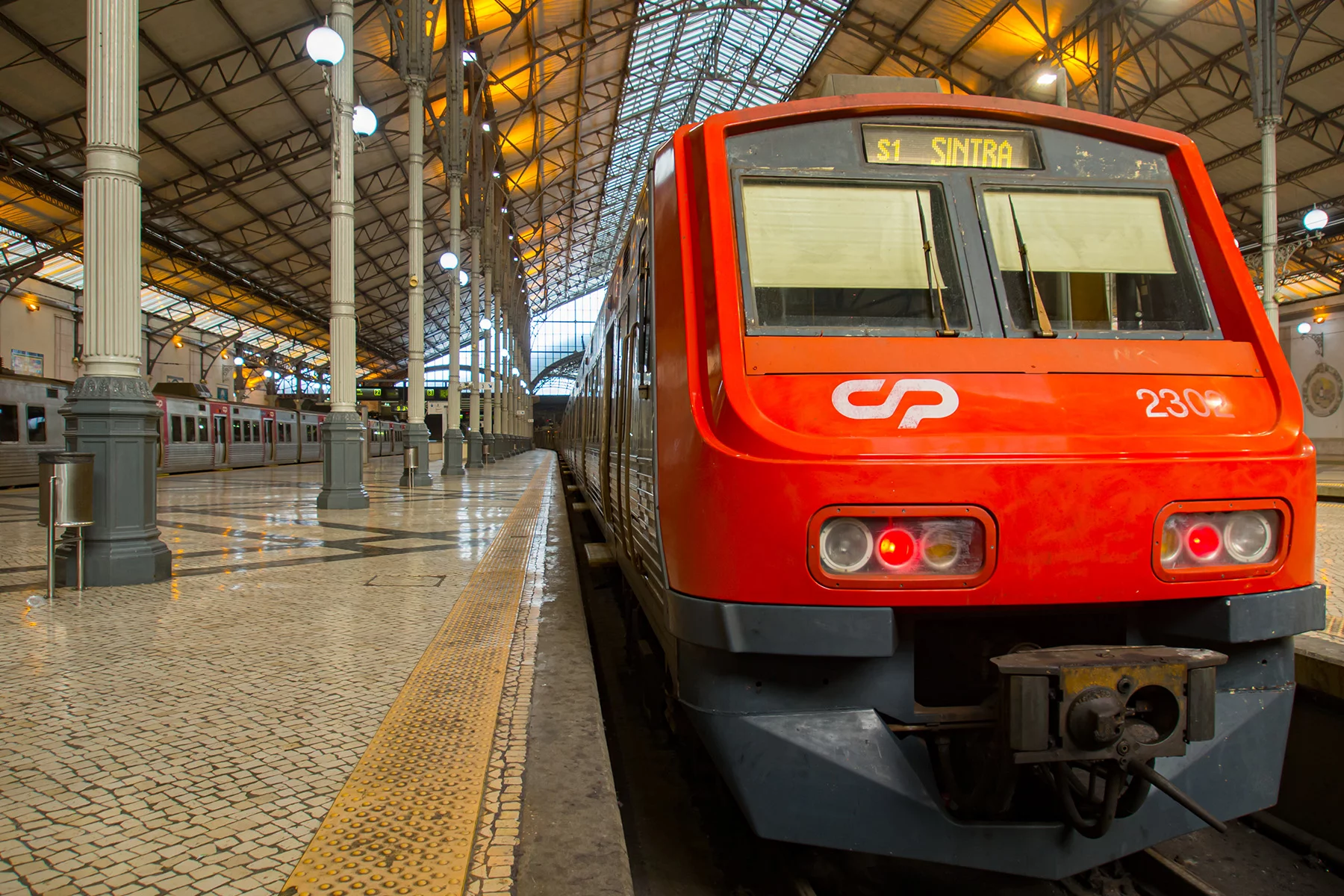
CP offers the following train connections:
- Alfa Pendular (AP) is the fastest, most comfortable, and most expensive direct service with speeds reaching 220 km/h. This service runs from Lisbon to Porto, as well as Coimbra and Braga in the north down to Faro in the south.
- Intercidades (IC) is a fast and slightly cheaper long-distance service whose speeds reach 200 km/h. IC trains tend to be slightly older and make a few more stops between major destinations.
- Regionais (R) is CP’s local service, stopping at all stations out of the Lisbon and Porto suburban areas. They are significantly slower and more basic than AP and IC.
- Urbano (U) is the CP’s commuter-focussed urban service, basically serving the surrounding areas of Lisbon and Porto.
Passengers are free to bring bicycles, pets, and luggage on-board without an additional ticket. Consult the CP’s general information page for specific conditions. CP’s main language of operation is Portuguese, although you can find some information on CP’s website in English. Announcements are in both Portuguese and English when arriving and departing from major cities.
CP offers a mobile app, available for both Android and iOS, to check timetables, book tickets, and edit travel itineraries.
Train tickets and costs in Portugal
CP’s ticketing website is reasonably easy to use, provides the most up-to-date scheduling information, and is the quickest way to buy train tickets. You can also order tickets through the CP mobile app or at the ticket counters in the train stations. Tickets can be sent to your smartphone via e-mail, the app, or SMS, which is much easier than having to print them off. Make sure you are able to show train conductors your valid ticket upon request; otherwise, you face a €120 fine.
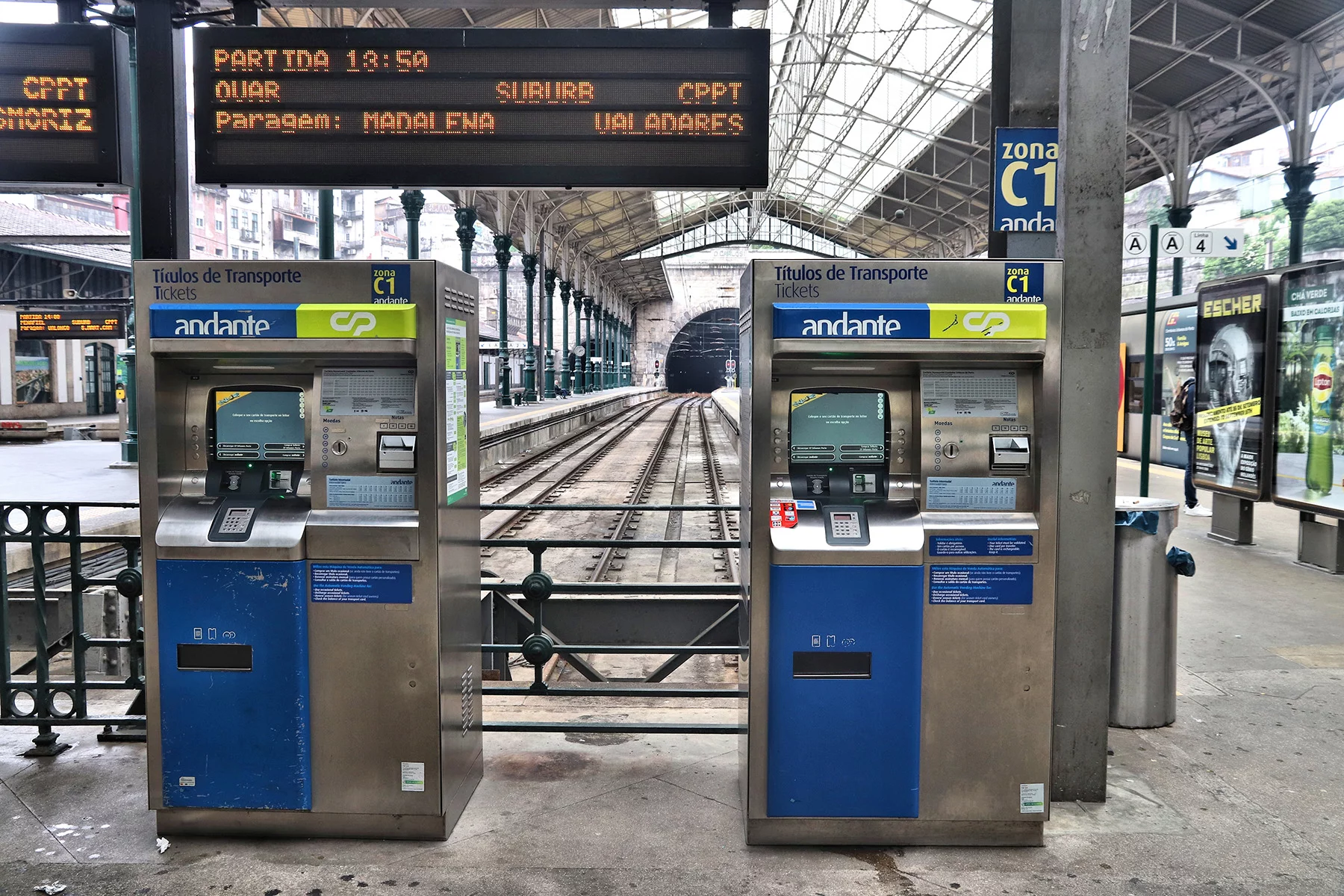
While first-class options are available on AP and IC trains, they do not come with many of the amenities that you might expect in other European countries (e.g., complimentary meals, drinks, newspapers). However, they do offer more legroom, comfortable seating and are only slightly more expensive than second-class options.
Discounts on train tickets are available if they are purchased at least five days (50%) or eight days (65%) in advance. Children under four years of age ride for free. Passengers over 65 or under 13 receive a 50% discount and those between 13 and 25 years of age receive a 25% discount. There are also discounts available for group bookings of at least four passengers. Consult the CP Discounts page for more information. If you’re planning on traveling extensively through Portugal by train and you’re not a resident of the country, you may want to consider getting a Portugal Rail Pass.
Train timetables and maps in Portugal
Trains in Portugal run throughout the day, although late-night travelers will probably need to resort to the night buses or taxis to get around the country effectively.
Itinerary planning, as well as conventional timetables, are widely available online. Travelers can use Google Maps or the CP mobile app to plan a trip on a smartphone. The CP website also has timetables for each individual train line in Portugal.
Train stations and stops in Portugal
The size and facilities of train stations in Portugal can vary quite widely. Porto’s São Bento Station is a stunning Beaux-Arts masterpiece with world-renowned painted azulejos depicting scenes of Portuguese history and Gare dó Oriente in Lisbon is a modern architectural wonder. Both have shops, restaurants, and international ticketing desks. Most urban train stations have plenty of facilities, including luggage storage and multilingual staff. Smaller regional stations may just have a single platform with a ticket machine.

Travelers can also browse all of the services available and timetables at specific train stations in Portugal on the CP website.
International trains in Portugal
International trains are available to connect key cities in Spain and Portugal. The Celta train links Porto and Vigo (Spain). The Lusitania overnight train connects Lisbon with Madrid, the Spanish capital. Trains to further European destinations can be arranged at Hendaye, a French town at the Spanish border. Reservations for these international trains can be made on the CP website or through Spain’s national railway company, RENFE.
Buses in Portugal
Portugal has a host of private bus operators, mostly organized into regional companies, that offer a network of bus services that extend beyond the reaches of the CP rail system.
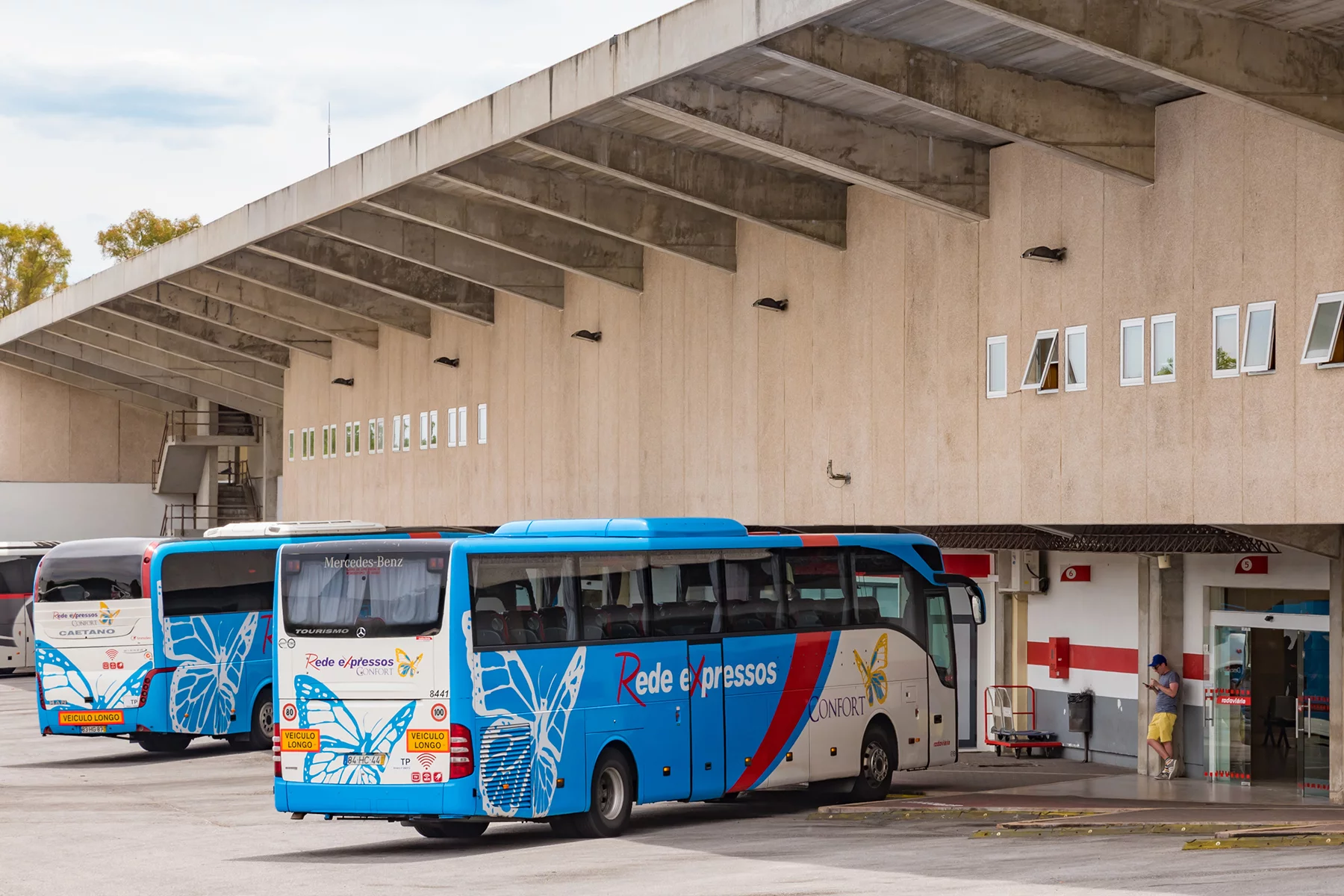
The main intercity bus companies are Rede Expressos (national), Rodo-Norte (northern regions), and Eva Transportes. Buses from these operators are generally quite modern, offering comfortable seating, reliable air-conditioning, and Wi-Fi. Some longer routes even offer food and drink services. You can often bring luggage and pets onto busses, but it’s best to check the company’s terms and conditions so you avoid any surprises.
Bus services in Portugal fall under the following four types, which are listed on timetables online or at the bus stations:
- Alta Qualidade: Deluxe, high-speed service between major cities
- Expressos: Comfortable, fast services between major cities
- Rapidas: Quick regional connections
- Carreiras (CR): Slower regional services stopping at most small towns
You should be able to get to most destinations in the country through local bus networks, with the exception of some remote beaches or nature parks. Keep in mind that services may be quite infrequent or non-existent on weekends. Be sure to check timetables so you don’t get stranded.
Buses in Lisbon are run through Carris. They generally run from 05:00 to 24:00. Check their website for some help with ticketing and routes.
In addition to Rede Expressos, there are a few international bus companies that operate in Portugal that have their own bus networks.
- Flixbus – Offers routes from Portugal to destinations all over Europe including Vienna, Paris, and Amsterdam.
- Alsa – Spain’s national bus company, covering routes to Madrid, Sevilla, and Barcelona, along with some routes into France.
Bus tickets and costs in Portugal
Tickets for intercity buses can be purchased directly at bus stations or online. Rede Expressos has an app, which is available on Android and iOS. This can be used to easily book tickets and keep track of your travel itinerary. You can also sign up for their RFLEX program, where you can receive significant travel discounts and enjoy greater customer service.
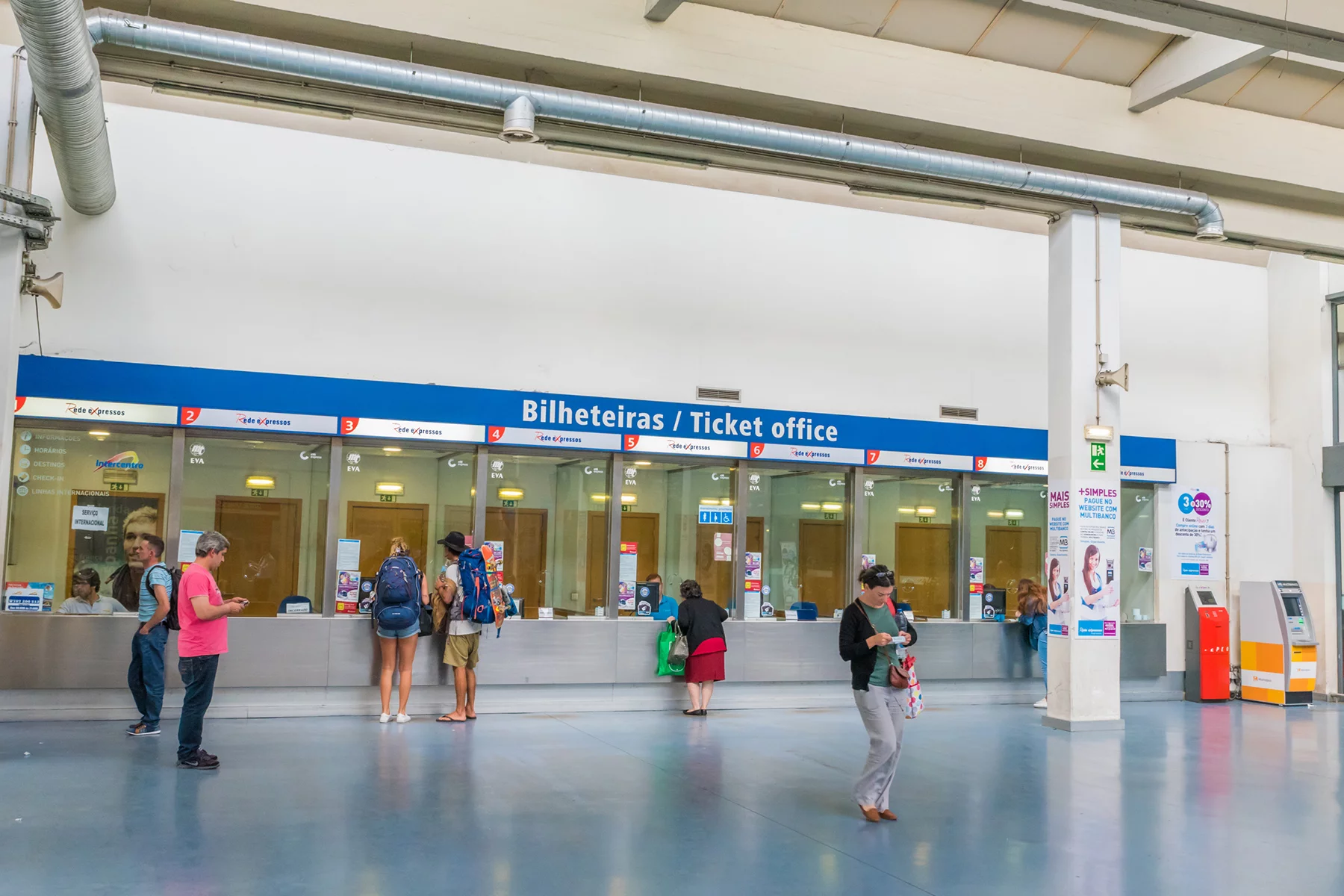
Local buses cannot be booked in advance, which means you have to actually go to a bus stop to see the timetable. You can buy a ticket on-board or at a nearby kiosk. In Lisbon, one-way tickets cost around €1.50–€2 or €6 for a day pass. You can also pick up a Viva Viagem card in Lisbon, which gives you reduced fares on all public transportation in the city. The card costs €0.50, is valid for one year, and can be topped up in denominations of €5–€20. You may also consider the Lisboa Card if you are in the city for a short period of time, as it gives you discounts on most tourist sites along with unlimited use of public transportation.
The costs for day passes in Lisbon are the following:
- One-day card: €20 (adults), €13 (4–15 years)
- Two-day card: €34 (adults), €19 (4–15 years)
- Three-day card: €42 (adults), €22.50 (4–15 years)
In Porto, you can get an Andante Monthly card for €40, which gives you unlimited travel throughout all transport zones in the city. Alternatively, you can pick up an Andante Tour card, which gives you unlimited travel for either 24 hours (€7) or 72 hours (€15). Additionally, the Porto Card offers you free entrance to city museums, discounts on tourist attractions, and unlimited use of public transportation. The costs are as follows:
- One-day card: €13
- Two-day card: €20
- Three-day card: €25
- Four-day card: €33
Bus timetables and maps in Portugal
Buses in Portugal run throughout the day, with regular routes from 05:00 to 24:00. Night buses are also available, but these have limited routes and generally only serve major cities.
Timetables and live departure information should be available on the websites or mobile apps of most intercity carriers. Local bus stations (Rodoviária or Camionagem) are usually the best places to check local services, timetables, and travel routes.
Taxis, ride-sharing, and other car services in Portugal
Taxis are widely available in big cities and can be a good deal at the right time of day. Rates generally increase by 20% after 21:00 or on weekends and holidays. Taxis are quite safe and reliable in Portugal, but it is still good practice to ask the rate upfront and provide the driver with the written address of your destination. You can get an estimate on the price for your trip by searching TaxiFareFinder. There are many taxi ranks in major cities near train stations and top-end hotels. However, your best bet is to call or arrange a taxi through services such as Retalis or Cooptaxis.
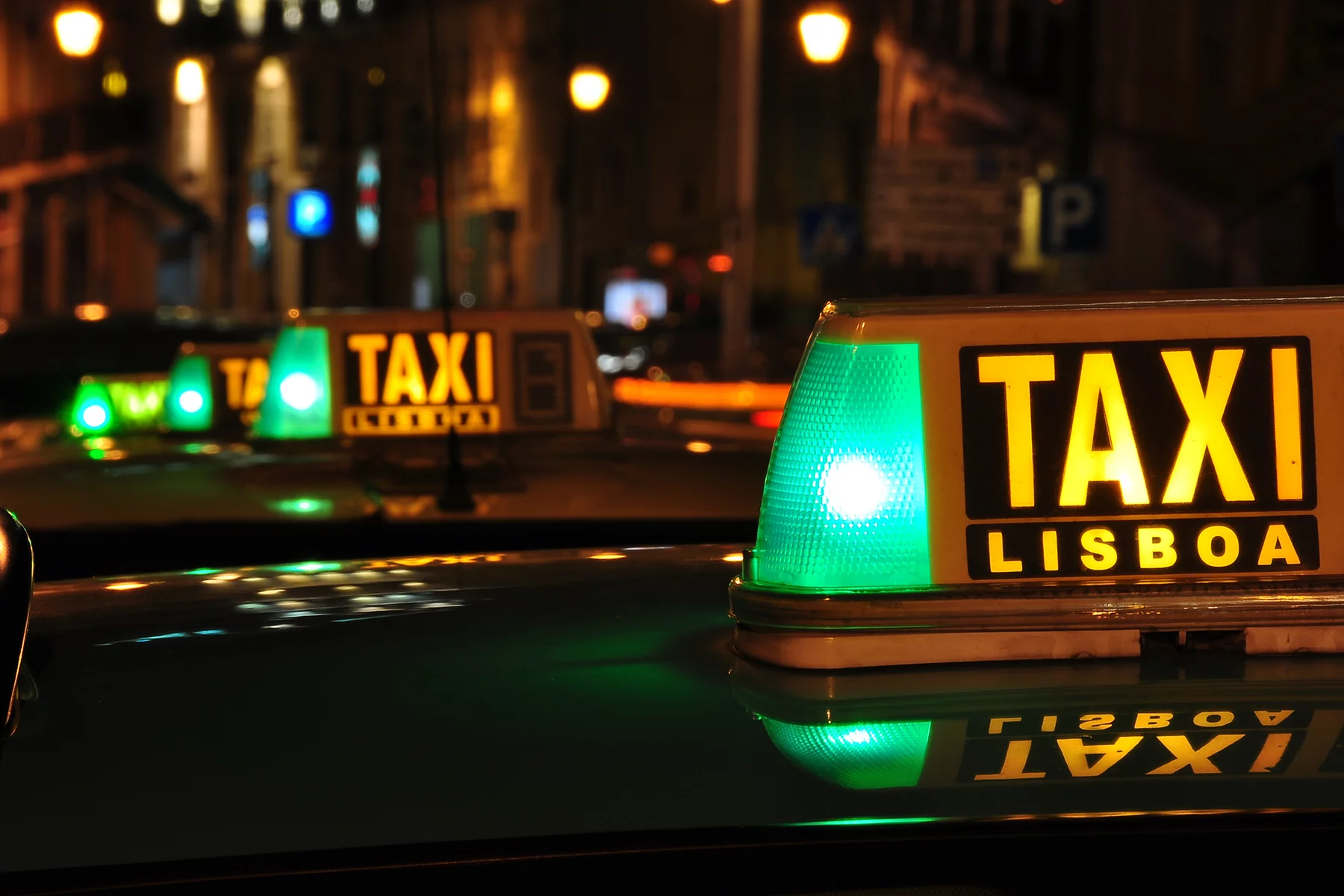
Uber has had a rocky history in Portugal, but is now able to operate in major cities such as Lisbon, Porto, Coimbra, Braga, and Faro. You could also try other ride platforms such as Cabify or Bolt. Ride-sharing services like BlaBlaCar and Boleia are growing in popularity in Portugal and are particularly useful for getting to rural parts of the country. It’s worth doing a price comparison between ride platforms and traditional taxis to see which offers the best prices and convenience.
Other methods of public transportation in Portugal
Lisbon and Porto are the only Portuguese cities with a metro system. Both networks are clean, safe, and efficient. Lisbon’s metro has four lines and 52 metro stations – 31 of which provide full accessibility with escalators and lifts. The network in Porto has six lines is the best way to get to the airport. The metro runs from 06:00 to 01:00. You can find your connections by consulting the Lisbon Metro and Porto Metro maps.
Lisbon and Porto also have trams and funiculars as part of their public transportation networks. Trips on these are included in the Viva Viagem or Andante transit cards. They are atmospheric ways to access the scenic miradouros (viewpoints). You can also take the popular historic tram 28 or tram 12 through the narrow streets of the Alfama. Try to get there early in the morning or later in the evening if you’re using them as part of your daily commute, as they’re quite popular with tourists.
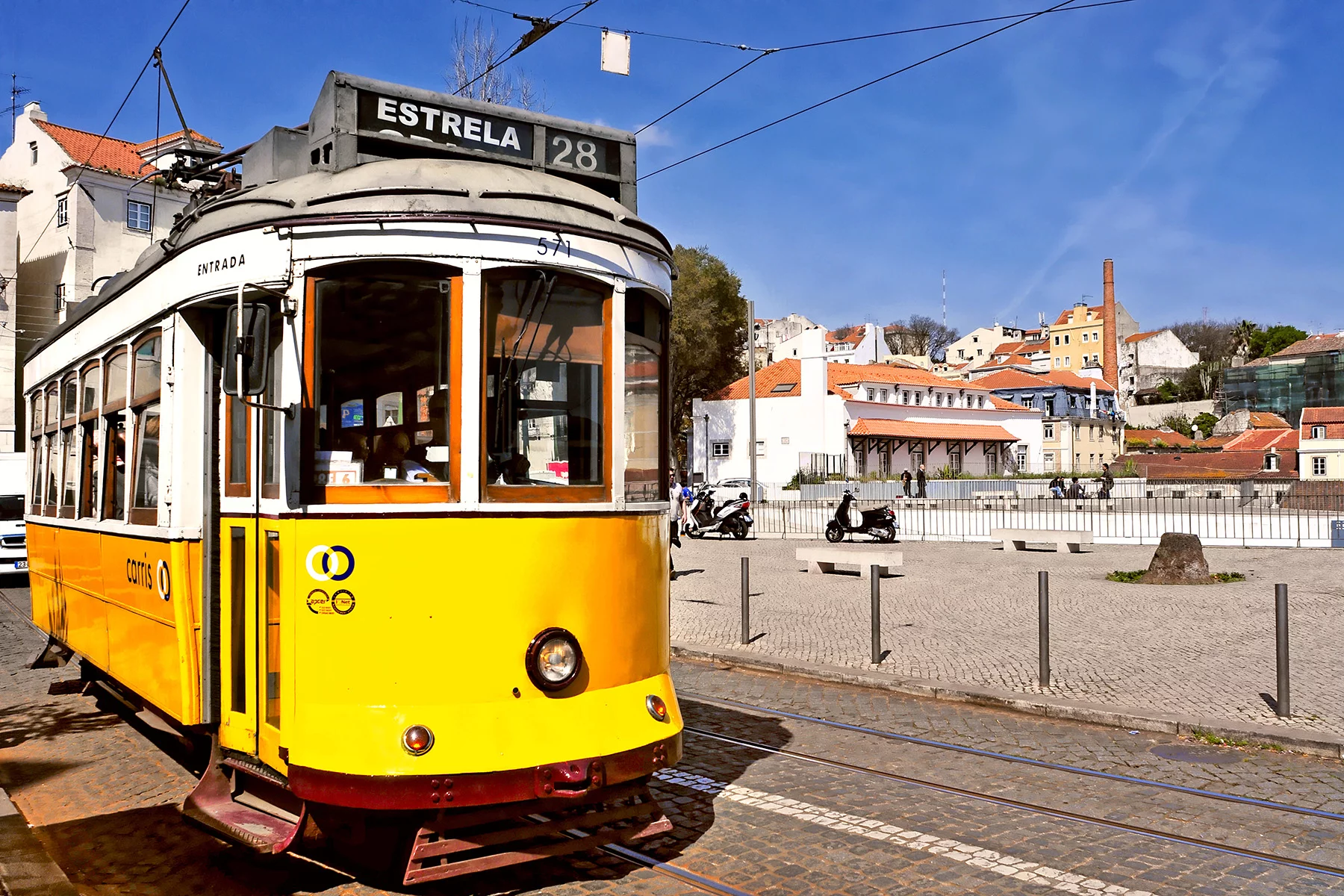
Cycling is also becoming a popular way of getting around in Portugal. A network of dedicated bike lanes is expanding throughout major cities and long-distance bike paths often use former rail lines in rural areas. The Gira Bike bike-sharing network in Lisbon allows riders to pick up and drop off bikes at docking stations throughout the city. Once you download the Gira app on Android or iOS, you can choose from the following subscription options, paying with a credit card or PayPal:
- 24-hour pass (€10) with unlimited 45-minute rides.
- Monthly pass (€15) with each 45-minute ride costing €0.10 (normal bikes) or €0.20 (e-bikes).
- Annual pass (€25) with each 45-minute ride costing €0.10 (normal bikes) or €0.20 (e-bikes).
Monthly and annual subscriptions are only available to Portuguese residents.
Public transportation discounts and financial aid in Portugal
In addition to the various discounts offered by train and bus operators in the country, the government of Portugal offers residents the opportunity to apply for the Passe Social+ card. This card is essentially part of the Portuguese social security system, as individuals must prove they are pensioners or from a low-income household. This model has been approved for the Lisbon and Porto transport systems.
The Portuguese government also offers subsidies (10% to 50% in some cases) for individuals to purchase bicycles. This is part of a wider effort to get people to use more environmentally-friendly commuting methods.
How disability-accessible is public transportation in Portugal?
Full accessibility across all modes of public transport in Portugal is not quite possible at every single stop, although the situation is improving. Bus operators are swiftly deploying low-floor buses and improving audio announcements on-board.
CP offers a centralized Integrated Mobility Service, which can be accessed by phone 24 hours a day by phone (+351 707 210 746). This service enables passengers with special needs to get information regarding the accessibility of trains and stations and request assistance with embarking, during the journey, and disembarking.
There are companies offering shuttle services for people with disabilities along with special taxis available at taxi ranks and airports. The city of Lisbon has put together an Accessible Tourism Guide with tips on transportation, hotels, restaurants, and attractions for those with special mobility needs.
How environmentally friendly is public transportation in Portugal?
Transportation is responsible for approximately 25% of Portugal’s energy-related CO2 emissions. With more and more flocking to urban areas, there is additional pressure on Portugal to reduce transport-related emissions.
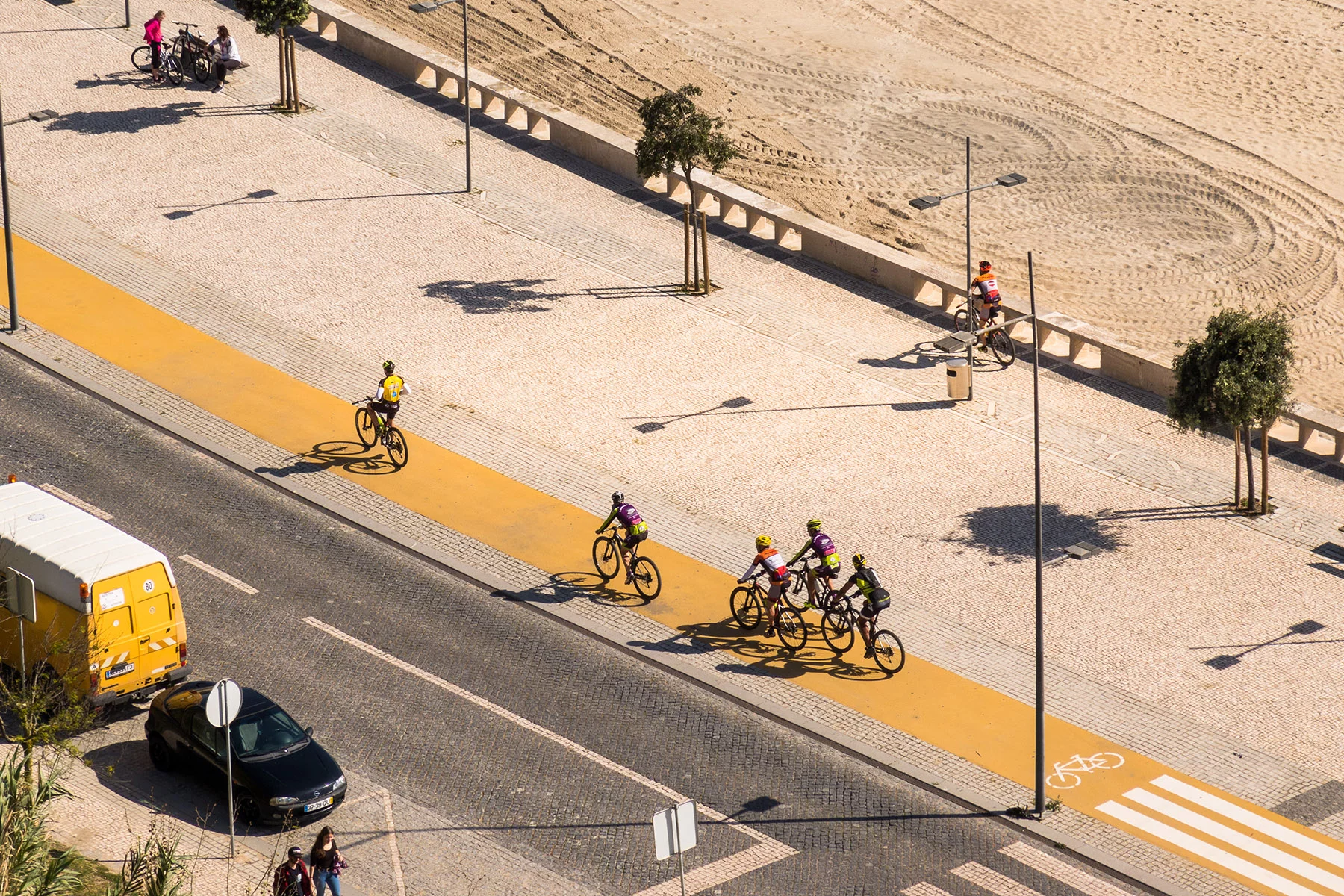
In 2020, Lisbon became the 11th city to receive the European Green Capital Award. Lisbon has strengthened and modernized its public transport fleet, simplified ticketing, and now offers additional discounts for commuters. This has increased public transport trips by 65 million since 2018. Lisbon has created 200 kilometers of new cycle paths in its municipal region and has extended the Gira Bike bicycle-sharing system across the city. The city has drastically increased its fleet of electric and hybrid public vehicles. Their target is to have 420 new buses and 25 streetcars on the road by 2023, further reducing the percentage of journeys made by car from 57% to 33%.
Lisbon signed the Corporate Mobility Pact for a more sustainable transport system together with another 57 leading companies. Lisbon also became the first European city to adopt the Mobility Data Specification. This allows shared bicycles and other mobility providers to open their data, helping transport authorities improve planning and management.
Public transportation safety tips in Portugal
Traveling on public transportation in Portugal is both efficient and safe. Considering the country’s relatively low crime rates, you should not have any trouble using public transit during operating hours.
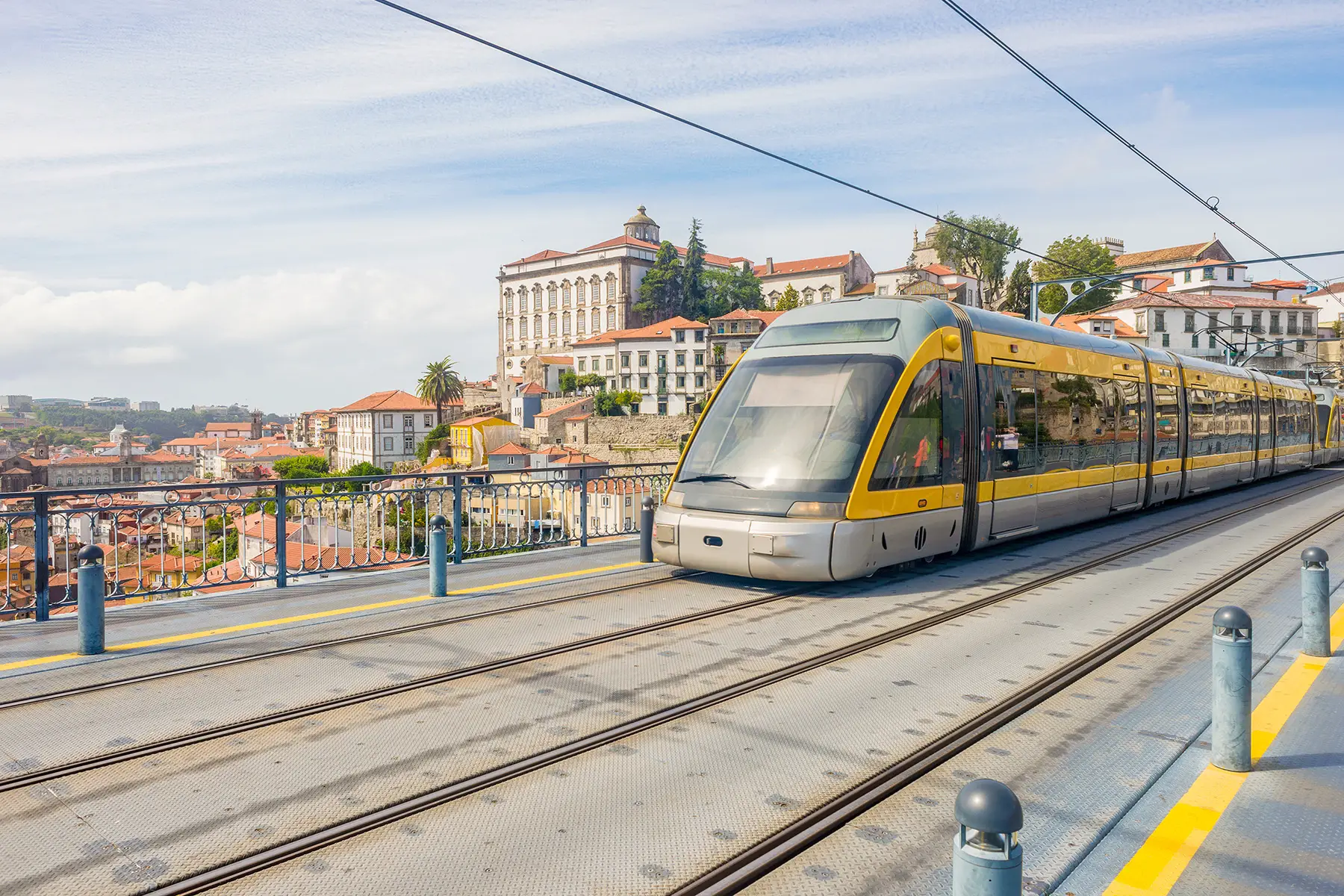
However, it’s worth keeping a close eye on your belongings in and around major train stations and other transit hubs. Be extra cautious when running to catch a crowded bus or train last minute, as this can leave you particularly prone to pickpockets. Be direct with taxi drivers at the beginning of your journey about your destination and the price for the trip so as to avoid scams.
Making a public transportation complaint in Portugal
Complaints and lost and found claims should be made directly to the specific transport company. You can find the relevant contact information below:
- CP: Customer Service, Lost and Found
- Rede Expressos: Customer Service, Lost and Found
- Metro Lisboa: Complaints, Lost and Found
- Metro do Porto: Complaints, Lost and Found
- Carris: Complaints, Lost and Found
You can also try contacting the government of Portugal’s lost and found portal (in Portuguese) for assistance in retrieving lost items.
Useful resources
- CP – Portugal’s national rail carrier
- Rede Expressos – the national intercity bus service
- PPL – Portugal’s national cycle touring network
- Carris – Lisbon’s public transport operator
- Metro Lisboa – Lisbon’s metro network
- Metro do Porto – Porto’s metro network
- CoopTaxis – Portugal’s national taxi company
